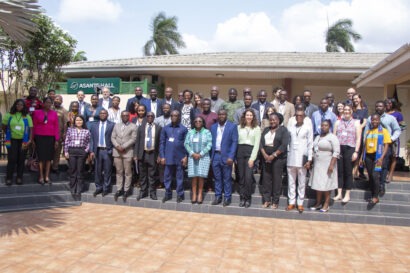Across Nigeria, a journey through rural communities and interaction with community members will expose you to the prevalence of self-financed and managed community development projects. The benefits of those projects completed through informal taxation to the people of Nigeria cannot be overemphasised, though many scholars and tax administrators are not aware or pay little attention to these forms of informal taxation because they are outside of the legal tax framework. Informal taxation refers to tax administration that is not embedded in the laws of a state but is driven by moral persuasion of local communities and enforced through social mechanisms, including, in some cases, coercion by non-state actors.
In many contexts, informal taxation is often necessary and a failure on the part of government to uphold the social contract that is embedded in formal tax administration. Most local communities that have been denied social amenities, particularly in rural communities in low-income countries, resort to informal taxation as a form of self-help, funding basic projects neglected by the government.
Failure on the part of the government to respond to the needs of these communities has led many communities across Nigeria to establish informal tax administration mechanisms in order to raise funds for basic public services and social amenity provisions like roads, bridges, hospitals, markets, schools, water projects, and security.
Sub-populations across regions in Nigeria have given different names to informal taxation, with some similar processes but variation in collection strategies and how revenues are used to fund the needed projects. For example, the Igbos from South-Eastern Nigeria refer to informal taxation as “Utu isi’ or Utu mmepe”, and is administered with consideration given to age and income, with, in most cases, older and more affluent individuals making more contributions.
The Tiv people in North-Central Nigeria refer to informal taxation as “Kpadegh”, which I have participated in as a member of the community. Among the Tiv, informal taxes are usually levied on community members without recourse to social stratification and the levies are mostly equally distributed among community members. The variation between the Tivs and the Igbos’ informal tax systems is shaped by differences in cultural and governance institutions in both areas.
While the Tivs are communist in nature, the Igbos are more or less republicans. In Northern Nigeria, locals of Kaduna state, home to the Zaira emirate, refer to informal taxation as Agaji or Aiki Gayya, which describes a form of self-help funding to provide basic amenities ranging from infrastructure to security.
After an interview with a member of Kaduna South community, I got to know that local community members make voluntarily contributions according to social stratification and, where any member has no money, can contribute via direct labour.
Benefits and challenges of informal taxation in the Nigerian context
From my perspective, I believe no one should overlook the enormous economic benefit driven by the practice of informal taxation. Most bridges that are left unattended by the government have been rehabilitated by communities through informal taxation. There are elites who head government institutions that were once educated in local schools funded by informal tax administrations.
And the contribution to community development is immense. For example, the Guma local government area of Benue State Nigeria, from where I hail, is dominated by rural settlements that receive little in the way of government-financed projects, despite taxes being paid by the locals. In 2017, the Nyiev community members launched a fundraising project to build the Keleke bridge connecting Udei town to other communities of economic importance.
In observing the process of informal tax collection, I noticed the high levels of informal tax morale and compliance by community members in order to achieve the project. This gave me an insight to the possibilities of a tax administration process that is outside the ambit of the law but that can be harnessed for community development.
Nevertheless, in as much as informal taxation reflects the failure of the formal tax administration system in Nigeria, it is not without problems that must be addressed. As a result of the non-legality of informal taxation processes, it can be associated with challenges ranging from poor accountability to lack of transparency.
In many contexts, there are no effective checks in place for those who administer informal taxation in the various communities. These issues can often lead to the collapse of community development projects and the discontinuity of informal tax collection, as informal tax revenues are either embezzled or misappropriated by those with the responsibility of informal tax administration at the community level.
Moreover, rural community members are often faced with the problem of multiple tax burdens as a result of participating in both formal and informal tax administration processes. Community members often feel reluctant to pay taxes outside the formal tax framework because of the extra tax burden, barring moral persuasion from the community leadership structure. Where these issues are persistent and burdens are heavy, community members may resort to non-compliance with informal taxes.
Although local community members reap benefits from informal tax administration—especially relative to the formal tax administration because of the low levels of infrastructure provided by government in many rural areas—it is not yet certain the extent to which the administration of informal tax affects compliance with formal tax amongst community members.
A need for more research on informal taxation in Nigeria
So far, there is paucity of data and information about the activities of informal taxation in Nigeria, and neither the government nor key stakeholders are doing enough to recognise its role in community development. The right data will allow informal tax administration in Nigeria to be better understood, conceptualised, and theorised.
A key question for future research is whether informal taxation can be institutionalised so as to be more effective, efficient, and accountable. It may be possible, for instance, for local governments to collaborate with communities through the provision of audit staff that can help communities monitor informal tax administration processes to ensure accountability. If accountability is ensured, other organisations and stakeholders who are concerned with development of local communities could consider co-funding arrangements with informal taxation, further enabling community development projects.
Presumably, the variation in information tax administration among Nigerian regions which in most cases causes accountability issues is premised on cultural, religious attitudinal and traditional governance factors. With more research and exploration of these factors, recommendations can be made to address the issue of accountability vis-a-vis social, cultural, and religious diversity factors amongst the regions.
With a stronger evidence base, informal taxation should be at the forefront of tax policy discussions in Nigeria and around the world, but the concept receives little attention from tax stakeholders and policymakers who may play a role in the institutionalisation of the practice. I believe further research into informal taxation and its policy implications will help us understand the fiscal gap created by the failure of formal tax administration in these communities and states in Nigeria and its consequences for community development, with significance for other countries facing similar challenges.




